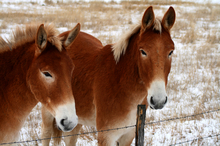The nation's biggest donkey rescue group, Peaceful Valley Donkey Rescue, says that since March 2011, it has taken in nearly 800 donkeys abandoned in Texas, where ranchers mainly used the animals to guard their herds. Many of the cattle and goats have been sold because of the drought and the nation's economic slump, putting the donkeys out of a job.

More donkeys abandoned than horses
Donkey rescue has taken in nearly 800 donkeys abandoned in Texas, where ranchers mainly used the animals to guard their herds.
During 2010 according to one source, just 100 donkey abandonments were reported nationally.More donkeys are being abandoned than horses. Some donkeys are left by roadsides
And although the drought that began in late 2010 is over now, the flood of donkeys continues, said Mark Meyers, executive director of Peaceful Valley Donkey Rescue.
"Last week I spent two days on the road and got 20 donkeys each day," he said Wednesday. Since then, he's had a call of about 12 more in the Midlands, Texas, area.
"Hay prices still haven't come down. And what little grass is growing, people are going to save it for the animals that are going to make them money," he said.
In the north Louisiana town of Athens, Keith Gantt, who rounds up loose livestock for the Claiborne Parish Sheriff's Office, says he has dozens of donkeys that he can't give away. Some he's had for two years.
"People just turn `em out on the highway. The sheriff's department makes me go catch them and then I get stuck with them," he said.
The donkey market has shriveled with the dried-up fields of Texas, where auction houses won't take them. Although some people blame the banning of horse slaughter plants in the US, very few donkeys were ever sold to the plants and very few are shipped to Canada or Mexico where equine slaughter continues.
A Colorado State University study published in 2001 found that of 1,348 animals surveyed at the three horse slaughterhouses then open, four were donkeys or mules. If those proportions were typical, 100,000 slaughtered equines might include 300 donkeys and mules.
